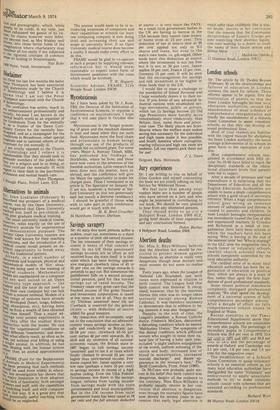London schools
Sir: The article by Dr Thodes Boysen (February 9) on the shortcomings and failures of education in London stresses the need for reform. Three reforms appear to be urgent: first the reallocation of powers so that the Inner London boroughs become loca! education authorites; second the abandonment of most schemes of comprehensive reorganisation and thirdly the establishment of a Schools Grant Committee to assist voluntary schools, so that they can develop on sound professional lines.
Most of your readers are familiar with the cogent reasons for abolishing the Inner London Authority; the below average achievements of its schools do great harm to the reputation of London.
Most comprehensive schools reorganised in accordance with DES circular No 10/65 have failed to reach the disciplinary standards or the educational attainment levels that parents were led to expect.
After a decade of promises and vast expenditure it is surprising that the Department of Education and all the English Education Authorities are unable to name a single comprehensive school with a good record of university entrance. When a huge comprehensive school goes wrong an immense amount of unhappiness and distress is caused to parents and children. In most London boroughs reorganisation has immediately caused the loss of able and experienced teachers. In Croydon and Richmond as a result of reorganisation there have been schools in which the teachers have not been saying 'Who is leaving at the end of the summer term' but 'Who is staying?' In the GLC area the resignation rate is much lower in voluntary schools (mainly church schools) than in schools completely controlled by the local education authority.
The cardinal error of so many local education authorities has been the organisation of education on political lines, which are always in a state of flux, rather than upon the firm foundations of good professional standards.
Some recent political manifestos completely disregard professional analysis; 'We shall speed the development of a universal system of fully comprehensive secondary schools.' After a decade of effort no fully comprehensive school exists in England or Wales.
Recent statistics in the Times Educational Supplement show that comprehensive schools are unsuitable for very able pupils. The percentage of secondary pupils in Comprehensive Schools was 28.9 per cent in 1970, 33.8 ISeY Cat in fffi ana in and 38.9 per
LCIIL III and the percentage of awards at Oxford and Cambridge was 2.1 per cent, 1.6 per cent and 1.8 per cent for the respective years.
The establishment of a Schools Grant Committee to assist 'voluntary schools is an essential reform as too many local education authorities have disregarded the name 'Voluntary' and endeavoured to apply unsuitable methods to try to make voluntary schools concur with schemes that are unsound according to professional standards.
Richard Wort
69 Murray Road, London SW19


































 Previous page
Previous page